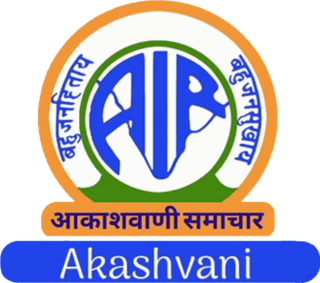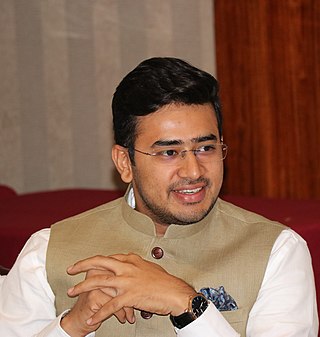Related Research Articles

Karnataka is a state in the southwestern region of India. It was formed as Mysore State on 1 November 1956, with the passage of the States Reorganisation Act, and renamed Karnataka in 1973. The state is bordered by the Lakshadweep Sea to the west, Goa to the northwest, Maharashtra to the north, Telangana to the northeast, Andhra Pradesh to the east, Tamil Nadu to the southeast, and Kerala to the southwest. With 61,130,704 inhabitants at the 2011 census, Karnataka is the eighth-largest state by population, comprising 31 districts. With 15,257,000 residents, the state capital Bengaluru is the largest city of Karnataka.
Events in the year 1994 in the Republic of India.

All India Radio (AIR), also known as Akashvani, is India's state-owned public radio broadcaster. Founded in 1936, it operates under the Ministry of Information and Broadcasting and is one of the two divisions of Prasar Bharati. Headquartered at the Akashvani Bhavan in New Delhi, it houses the Drama Section, FM Section, and National Service. It also serves as the home of the Indian television station Doordarshan Kendra.

Basangouda Ramangouda Patil Yatnal is an Indian Bharatiya Janata Party politician and Hindu leader who was the Minister of state for Textiles from 1 July 2002 to 8 September 2003 and Minister of state for Railways from 8 September 2003 to 16 May 2004 and current MLA from Bijapur City Assembly constituency since 2018. He has been a member of parliament from the Bijapur constituency for two terms and has been a member of the legislative council from the Bijapur Local Authorities constituency for one term.
The Belagavi border dispute or Belgaon border dispute is a dispute between the Indian states of Karnataka and Maharashtra over the administration of Belagavi. Belagavi is now a district in Karnataka, but in British India, was part of the Bombay Presidency, together with present-day Gujarat, Maharashtra, and certain areas of Karnataka.

Popular Front of India (PFI) is an Islamist political organisation in India, that engages in a radical and exclusivist style of Muslim minority politics. Formed to counter Hindutva groups, it was banned by the Indian Ministry of Home Affairs under Unlawful Activities (Prevention) Act (UAPA) on 28 September 2022 for a period of five years.
Veerendra Basappa Patil was a senior Indian politician and was twice, the Chief Minister of Karnataka. He became Chief Minister for the first time from 1968–1971 and the second time was almost 18 years later, from 1989–1990.

DD Chandana is a Kannada TV channel owned and operated by Prasar Bharati under Doordarshan, supported by Doordarshan studios in Bengaluru and Kalburgi. Launched in 1994 DD Chandana has entertainment serials, infotainment programmes, news and current affairs, social programmes and film programmes as its major content. In terrestrial mode, DD Chandana is available to 81.7% of the population of Karnataka. DD Chandana TV channel also available on DD Free dish DTH, at channel number 86.
The 1991 anti-Tamil violence in Karnataka refers to incidents of mob violence targeting Tamils in state of Karnataka in India. The incidents took place in Southern Karnataka on 12–13 December 1991, mainly in the cities of Bangalore and Mysore. The attacks originated in the demonstrations organised against the orders of the Cauvery Water Tribunal appointed by the Government of India. The violence terrified the Tamil populace of Southern Karnataka forcing over a thousand Tamils to flee in a matter of weeks. The official statistics given by the Government of Karnataka was that sixteen people had been killed in the police firing during protest but individual sources give higher numbers.

Changaai Mangalote Ibrahim is an Indian politician and was the president of Janata Dal (Secular) Karnataka. He was formerly an Indian National Congress (INC) politician. He was a member of the Karnataka Legislative Council. He joined Janata Dal (Secular) and is serving as its State President from 17 April 2022 till he dismissed.

Basavaraj Somappa Bommai is an Indian politician and engineer who is currently serving as the Lok Sabha MP of Haveri and previously served as the 23rd Chief Minister of Karnataka from 18 July 2021 to 19 May 2023. He formerly served as the Interim Leader of the Opposition in Karnataka Legislative Assembly as a member of the Bharatiya Janata Party and he was former member of the Janata Dal and Janata Dal (United). He was a Member of the Legislative Assembly in the legislature of Karnataka for Shiggaon, from where he has been elected four times since 2008. Between 1998 and 2008, he was a member of the Karnataka Legislative Council from Dharwad local authorities. He served as Minister for Water Resources and major and medium irrigation from 2008 to 2013, Home Affairs, Law and Parliamentary Affairs and Cooperation between 2019 and 2021 minister in charge of Haveri and Udupi districts from 2019 to 2021.

The clashes between the Jat and Muslim communities in Muzaffarnagar district of Uttar Pradesh, India Total death is 162 mostly and injured 930 and left more than 50,000 people displaced. By date 17 September, the curfew was lifted from all riot affected areas and the army was also withdrawn.

Bengaluru, formerly called Bangalore, is the capital and largest city of the southern Indian state of Karnataka. As per the 2011 census, the city had a population of more than 8.4 million, making it the third most populous city in India and the most populous in South India. The Bengaluru metropolitan area had a population of around 10.5 million, making it the fourth most populous urban agglomeration in the country. It is located near the center of the Deccan Plateau, at a height of over 900 m (3,000 ft) above sea level. The city is known as India's "Garden City", due to its parks and greenery.

Ram ke Naam is a 1992 documentary by Indian filmmaker Anand Patwardhan. The film explores the campaign waged by the right-wing Hindu nationalist organisation Vishva Hindu Parishad to build a temple to the Hindu deity Ram at the site of the Babri Masjid in Ayodhya, as well as the communal violence that it triggered. A couple of months after Ram ke Naam was released, activists of the VHP and other Hindu nationalist groups demolished the Babri Masjid in 1992, provoking further violence. The film earned Patwardhan a wide recognition, and received several national and international awards.

Gauri Lankesh was an Indian activist and journalist from Bangalore, Karnataka. She worked as an editor in Lankesh Patrike, a Kannada weekly started by her father P. Lankesh, and ran her own weekly called Gauri Lankesh Patrike. She was murdered outside her home in Rajarajeshwari Nagar on 5 September 2017. At the time of her death, Gauri was known for being a critic of right-wing Hindu extremism. She was honoured with the Anna Politkovskaya Award for speaking against right-wing Hindu extremism, campaigning for women's rights and opposing caste based discrimination.

Lakya SuryanarayanaTejasvi Surya is an Indian politician, RSS swayamsevak and lawyer serving as the Member of Parliament in the 17th Lok Sabha from the Bharatiya Janata Party, representing the Bangalore South constituency. He is also the president of the Bharatiya Janata Yuva Morcha since 26 September 2020.

On the night of 11 August and the early hours of 12 August 2020, violent clashes took place around the residence of a legislator and the police stations of KG Halli and DJ Halli of the Indian city of Bangalore, Karnataka. A group of Muslims, angered by a Facebook post on Muhammad allegedly shared by Akhanda Srinivas Murthy's nephew, a state legislator of the Indian National Congress, arrived at his house in protest, which later turned violent.

Rama Navami is a Hindu festival celebrating the birthday of Hindu deity Rama. It falls on the 9th day of the Chaitra month every year in the Hindu calendar, usually during the months of March–April. At least since 1979, if not earlier, this festival has involved carrying out processions throughout the cities, which also enters into Muslim dominated areas sometimes as a way to show Hindu strength. These procession by Hindus, often considered offensive by the Muslims, have repeatedly led to violence between Hindu and Muslim communities.
On 10 April 2022, a clash between Hindus and Muslims occurred in the city of Khargone, Madhya Pradesh. It took place between 5:00 pm and 6:00 pm, in the midst of a Ram Navami procession organised by a Hindu nationalist organisation allied to the ruling Bharatiya Janata Party (BJP). At 5:00 pm, when Muslims were gathering for evening prayers at the neighbouring Jama Masjid, the procession had not yet departed from the city's central Talab Chowk area.
References
- ↑ "urdu news broadcast triggers 3day riot in which 23 die in bangalore". ucanews.com. Retrieved 17 December 2023.
- ↑ Dahlburg, John-Thor (9 October 1994). "War of Words Turns Fatal in India : Violence: Dispute over Urdu language being used on a 10-minute TV broadcast leads to riots, 17 deaths". Los Angeles Times. Retrieved 4 December 2024.
- ↑ Swamy, Rohini (13 August 2020). "Bengaluru has seen 8 major riots since 1986 — including two over Prophet Muhammad". ThePrint. Retrieved 4 December 2024.
- ↑ "URDU NEWS BROADCAST TRIGGERS 3-DAY RIOT IN WHICH 23 DIE IN BANGALORE". UCA News . 11 October 1994.
- ↑ "War of Words Turns Fatal in India : Violence: Dispute over Urdu language being used on a 10-minute TV broadcast leads to riots, 17 deaths". Los Angeles Times . 9 October 1994.
- ↑ Rai, Saritha (31 October 1994). "Urdu news bulletin on Bangalore Doordarshan sparks off riots". India Today . Retrieved 20 November 2022.
- ↑ Engineer, Asghar Ali (1994). "Bangalore Violence: Linguistic or Communal?". Economic and Political Weekly. 29 (44): 2854–2858. ISSN 0012-9976. JSTOR 4401963.
- ↑ "Urdu news bulletin on Bangalore Doordarshan sparks off riots". India Today. Retrieved 17 December 2023.